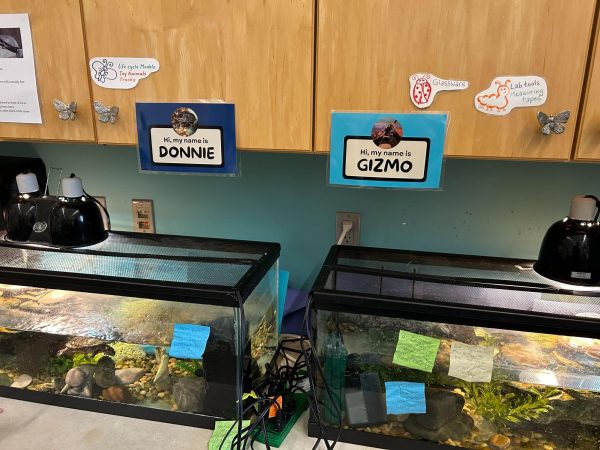Biology department hosts play about Charles Darwin exploring science and faith
If Charles Darwin’s “On the Origin of Species” revealed the scientific truths behind the development of all living things, then the play “Mr. Darwin’s Tree” seeks to reveal truths behind Charles Darwin. Calvin’s biology department recently sponsored a performance of “Mr. Darwin’s Tree” on campus.
“Mr. Darwin’s Tree” was a one-man performance, starring British actor Andrew Harrison. This simple format, plus the minimal use of props, fit the tone of the show well, as its primary focus is on big, abstract questions. The play tells the story of naturalist Charles Darwin, whose theory of evolution by natural selection has re-shaped science.
Harrison seamlessly alternated between the roles of narrator and Darwin himself to tell Darwin’s story. The play chronicles Darwin’s trip aboard the HMS Beagle to the Galapagos, his marriage to a devout Christian Emma Wedgewood, the death of his daughter Annie, and finally the publication of “On the Origin of Species.” The play also showcases Darwin’s inner struggles about faith and science, and invites the audience to explore these questions as well.
The play was well-attended by an audience consisting of Calvin students, biology department faculty, elderly couples and local high schoolers. Chimes spoke to several Calvin students after the show to gauge their reactions, which were overwhelmingly positive.
“I liked the actor; he really played the part well,” said Calvin junior Jasmine Carr.
Sophomore Jenna Radomski praised the play’s focus on Darwin’s personal life, saying, “I liked hearing about his family history rather than how we hear about him in the science classroom.”
In the play, Darwin, an atheist, worries about his lack of religion hurting his relationship with his deeply religious wife Emma, but although she maintains her faith, she does not judge him for not being a Christian. She does, however, wish that he could come to share her faith.
The publication of “On the Origin of Species” angers some people, as they see the theory of evolution as anti-Christian. Darwin finds himself in the national spotlight. He firmly believes in the theory that he has discovered, yet publishing his beliefs is difficult because of the cultural backlash. Speaking about embracing evolution, Harrison’s Darwin says, “Let go and freefall into the abyss.”
However, whether such tensions between science and faith do exist was the main subject at a panel of faculty members who spoke after the play. Religion professor Daniel Harlow objected to the notion that Genesis 1 is meant to be read as a scientific explanation of creation.
“When you try to extract science from a book written before science, you are not being faithful to the Bible,” he said.
William Katerberg, a history professor, talked about the historical context and impacts of “On the Origin of Species.” He explained that Christians didn’t really begin objecting to evolution until the 1920s, when the issue became part of a larger cultural crisis during the fundamentalist movement. At Calvin, however, “On the Origin of Species” was never seen as problematic.
“Professors at Calvin in the 10s and 20s and 30s tended not to see Darwinism as a crisis,” said Katerberg. He went on to explain the reasons why Calvin stayed out of the evolution culture war: the intellectual tradition of the Dutch Reformed Church, and the fact that at the time Calvin identified more as an immigrant college than an American institution.
Physics and astronomy professor Loren Haarsma talked about how he never personally saw a conflict between his scientific work and his Christian faith, since he grew up being taught about God’s sovereignty in all things. He explained that on the rare occasions where the two seemed to be in conflict, he talked to his friends in the religion and theology department and “the end result was a much deeper faith and appreciation of God.” Commenting on the relationship between science and faith, Haarsma said, “If science can understand how stars can form… God is still doing that.”








